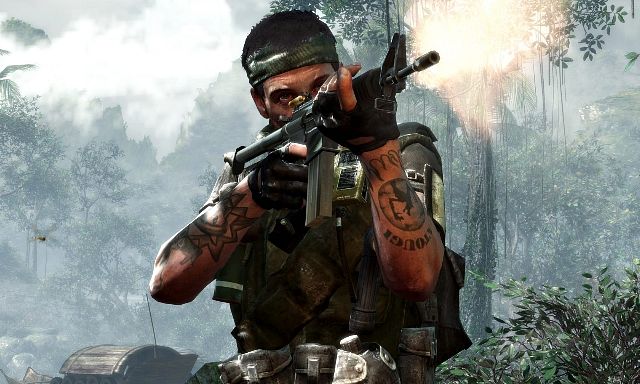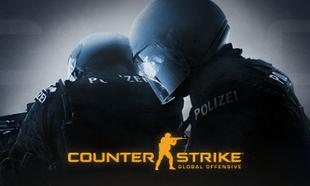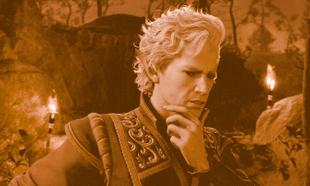Since launching in 2003, ostensibly as a competitor to 'Medal of Honor', the 'Call of Duty' franchise has gone through some pretty significant changes.
You had games like 'Call of Duty: Ghosts', 'Black Ops', and then you had the more sci-fi elements like 'Advanced Warfare' and 'Infinite Warfare' - not to mention the multiplayer aspects of 'Black Ops 4' on top of that. With the rebooted 'Call of Duty: Modern Warfare' hitting shelves next week, we're looking at the best single player campaigns of the franchise. Obviously, multiplayer is a completely different aspect of the game, so for this, we're focusing in on single player and is why we're leaving out 'Black Ops 4' altogether.
We begin at the bottom with...
'CALL OF DUTY: INFINITE WARFARE'
While 'Infinite Warfare' is often cited as the punching bag of the franchise, there's pretty good reason for that - it really is terrible. The storyline doesn't really make much sense, and the fact that it tries to take the game into space adds almost nothing to it. You pilot fighter jets in space, sure, but the control system never once goes above feeling like you're on a rail shooter. Not only that, the clunky and flat dialogue from all the actors concerned - Kit Harington, that guy from 'Generation: Kill' and 'Mad Men', Dano from 'Love/Hate' - just adds to a misshapen part of the franchise. At least you got the remastered version of 'Modern Warfare' with it.
'CALL OF DUTY: ADVANCED WARFARE'
Never mind it's got Kevin Spacey in it, the fact remains that having Kevin Spacey in a 'Call of Duty' game was just plain weird. His face looked like some kind of skin-robot mask, and the voice acting sounded like a guy who was counting out his earnings with each and every syllable. Not only that, the whole story was just dumb as hell and not one of the missions remotely stood out from the other. Sure, you might have had those power-suits to jump around the map, but really, it made so little odds to how interesting the game was that it ultimately ended up being more annoying than exciting.
'CALL OF DUTY: BLACK OPS III'
To be fair, by the time 'Black Ops III' rolled around, you could tell that Treyarch were tacking on the single-player campaign to fulfill a generally held contract with first-person shooters. When 'Black Ops 4' launched, leaving out a single-player campaign was probably the best thing they could have done with it. About as dire as the 'Black Ops' shingle got, the third installment tried to rope in RPG elements with absolutely no thought to how it'd work in a fast-paced, first-person shooter environment and ultimately never added anything to it. Come to think of it, the only thing 'Black Ops III' had going for its single-player campaign was the 'Nightmare' scenario. Even at that, it didn't add much.
'CALL OF DUTY: GHOSTS'
If you can believe it, the storyline for 'Call of Duty: Ghosts' was written by Stephen Gaghan, the man who wrote Steven Soderbergh's 'Traffic' and directed 'Dolittle', Robert Downey Jr's first post-Marvel movie. You'd think with those kind of credentials, he'd be able to come up with something a bit more original and compelling that what went on here. Although there were some interesting and well-made missions - 'Federation Day' sticks out, for sure - there wasn't enough in 'Call of Duty: Ghosts' to make it memorable beyond this. It's a shame, because there could have been something original here, by making it a more stealth-focused game than what ultimately turned out to be 'Black Ops'-lite.
'CALL OF DUTY: MODERN WARFARE 3'
For what had come before in 'Call of Duty: Modern Warfare 2', the threequel felt like every other threequel you'd see at the cinema. Sure, the familiar elements were there, you knew where the story was headed and the action felt like it was working on a bigger, better scale. Yet, none of it could connect in the same and it may have simply been a case of trying to do too much rather than necessarily trying for something new. That said, it had its moments and the story - while riddled with inconsistencies and cliches - did build up to something close to a satisfying finish.
'CALL OF DUTY' / 'CALL OF DUTY 2' / 'CALL OF DUTY 3'
This might seem like a cop-out to lump the three original games together into one heading, but really, they're very much the same game with better graphics and richer mechanics than actively adding anything different. World War II games, by and large, took major battles from the era and funneled them as best they could into the game's mechanics. 'Call of Duty 3', for example, took the tanks gameplay system and crafted the Polish campaign around it, dumping players into the Battle of the Falaise Pocket. 'Call of Duty 2' and its Soviet campaign focused in on the battle for Stalingrad, something that 'Call of Duty: World at War' also did very well, albeit with better results. They all worked great, but you could tell it was merely a case of rotating around the story rather than actively making something new.
'CALL OF DUTY: WORLD AT WAR'
Compared to the heroics of the three 'Call of Duty' games that kicked off the franchise, 'World At War' seemed to focus in how truly brutal and ruthless World War II was. That the game opens with a brutal torture scene at a Japanese prison camp, after which follows you leading an assault on that same prison camp. A later mission sees you crawling through the dead bodies of Stalingard in order to get a sniper's nest. Up until this point, none of the World War II games ever went quite so hard or dark, though they sometimes flirted with it. 'World At War', however, went fully in.
'CALL OF DUTY: WWII'
Far and away the best of the more recent 'Call of Duty' franchise games, 'WWII' felt like a return to form - not just because it went back to the setting from which the game began. You could tell just by playing the single-player campaign that there was a renewed sense of focus and commitment to making it a better experience, rather than necessarily tacking it on and slapping a recognisable actor into the voice cast to get it over the line. The storyline had an emotional punch to it, something that had been missing from previous games and was sorely needed to sustain it over the somewhat familiar mechanics in the game.
'CALL OF DUTY: BLACK OPS II'
As sci-fi elements go, 'Black Ops II' was probably as far as they should have pushed it. The use of drones, viruses, and squirrel-suits were definitely interesting, but trying to draw influence from the 99% / 1% divide in society, the invasion of Panama in 1989, and rare-earth elements meant that you ended up with something pretty muddled. That said, patching together the story from 'Black Ops' and joining it all as a father-son idea worked, if it was just a tad bit too cliched for its own good. Bringing in real-world characters like Manuel Noriega, Oliver North (who actually voiced himself), and David Petraeus was a bold move, but again, it added a certain level of authenticity to the game that acted as a counterbalance to the sci-fi elements.
'CALL OF DUTY: MODERN WARFARE'
Far and away, the best decision ever made in the 'Call of Duty' franchise was bringing it forward to today's age. It wasn't just that World War II had become overused by every developer out there, but it also represented how the graphics and technology had moved forward to allow for much more fast-paced action. 'Modern Warfare' had all the energy and the excitement of a major blockbuster movie, and it's probably why it had the likes of Hans Zimmer contribute to the soundtrack. Missions like 'All Ghillied Up' played beautifully and acted as a tense mid-point in the story, pausing the thrust of the story simply to give it some context and to allow players to experience the atmosphere and tension.
'CALL OF DUTY: BLACK OPS'
In comparison to the other 'Call of Duty' single-player campaigns, 'Black Ops' really did try to play with the narrative i a way that hadn't been tried before in gaming. It didn't work all of the time, sure, but it was incredibly well-designed and leaned into spy-thriller tropes in a way that games don't often. That the game was told entirely through interrogation - with you finding out everything as you go along - is a clever storytelling mechanic, but it's the quality of the voice-acting - Ed Harris, Gary Oldman, Sam Worthington - that really pushes it up another level. Not only that, missions like 'WMD' - which sees you a radar officer aboard a SR-71 Blackbird, and splits it down to ground level as you lead a covert assault - works wonderfully in that '60s spy-thriller vibe.
'CALL OF DUTY: MODERN WARFARE 2'
To be honest, you could write an entire piece about one mission in 'Modern Warfare 2', and we're naturally talking about 'No Russian'. The mission is legendary, for both its controversy and for how terrifying it is. It really does demonstrate how far gaming has come forward as an art that the violence that is so inherent in first-person shooters is now being examined in the way it is, and games like 'Spec Ops: The Line', 'Dishonored', and 'Metal Gear Solid V: The Phantom Pain' are evidence of it. 'No Russian', however, rubbed your nose right up against it in a way that was bound to cause controversy.
For those unfamiliar with the game, here's the basic gist - the mission sees you a US soldier who has infiltrated a group of Russian ultranationalist mercenaries, led by a psychotic mass-murderer named Makarov. You, along with Makarov and three other henchmen, enter Moscow's airport and open fire on a group of civilians going through security. Interestingly, the mission doesn't fail if you don't shoot, but it does fail you if you try to stop it. After all, this mission places you as an infiltrator, meaning you have to watch them to do this so as to not blow your cover.
You have to follow along, helplessly, as they murder unarmed people and police officers as they scream and run for cover. It's vicious stuff, and playing it for the first time makes you feel queasy - but that's exactly the point of it. You spend half the game happily firing off bullets without a care in the world, but when it's transported to something like this, you're faced with the horrors of your actions. Where the mission eventually winds up might seem like a cop-out - you're betrayed by the same mercenaries and left for dead, pinning the massacre you just took part in on your identity as a US soldier - but it's a bold choice nonetheless.
Beyond 'No Russian', the game's single-player campaign is as compelling as any blockbuster movie. Racing a snowmobile through the mountains, blasting your way through a prison, rapelling down the side of a mountain, all the beats are there and they feel like they're in there because the story dictates it, not because it looks cool and that it'll make for interesting gameplay. What sometimes get neglected in first-person shooters is how we experience them like movies, even though it's an active experience. 'Modern Warfare 2' grasped this and crafted a major studio action blockbuster, and it worked.









































































